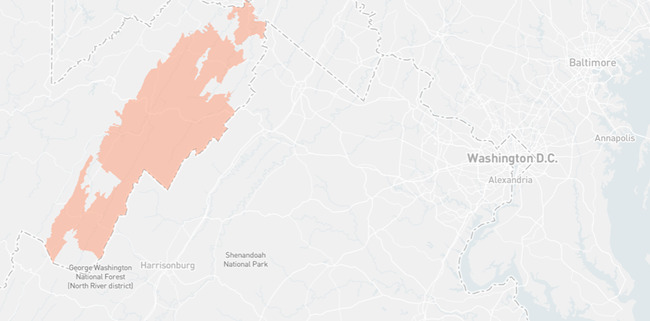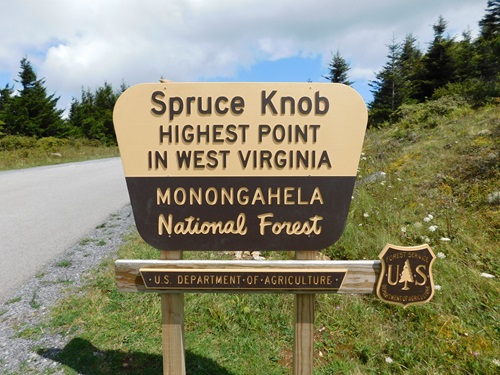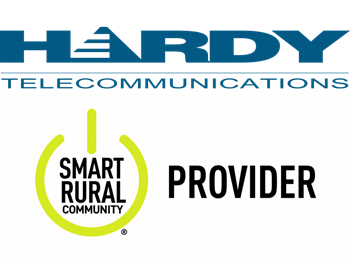
Fast, affordable Internet access for all.

The rocky rural hills of West Virginia are a formidable foe when it comes to building high-speed Internet infrastructure that offers affordable high-quality service.
Nobody knows that better than Hardy Telecommunications (OneNet), a small community-owned cooperative that delivers affordable fiber to frustrated locals deemed too costly and cumbersome to be served by the incumbent telecom giants.
The cooperative serves parts of four counties (Hardy, Pendelton, Grant, and Hampshire). It connected its first fiber customer in 2013, after receiving $31.6 million in federal BTOP funding. Since then, the cooperative tells ILSR they’ve spent $20 million of their own funds to bring fiber to rural corners of the aptly-named Mountain State.
Derek Barr, Assistant General Manager at Hardy Telecommunications, says the cooperative currently delivers broadband service to 5,050 rural subscribers – 4,736 of which are on fiber lines that simply wouldn’t exist without federal funding programs. Hardy Telecommunications also provides 68 customers with fixed wireless access (FWA) broadband service.

“Our focus is fiber, and we're trying to build out fiber as much as we can,” Barr tells ILSR. “But it's very tough in our serving region. It's all mountains and a lot of trees, and a big chunk of our area is either state park or national forest land. It's also very hard to do fixed wireless because even if it might work in the winter, it's not going to work in the summer” when tree leaves block line of sight, he noted.
So the cooperative slowly and consistently expands fiber as it can, often in partnership with Pendleton County. As a result, locals have the option of a variety of double and triple play phone, cable, and fiber options, starting with a symmetrical 100 Mbps (megabit per second) downstream, 50 Mbps upstream fiber and phone bundle for $79 a month.
While the co-op doesn’t offer standalone fiber, it’s something they hope to offer in the “near future.”
“We're seeing a lot of people who are either retiring here or have weekend homes or vacation homes or seasonal homes,” Barr said. “We have a pretty heavy seasonal population here. And when Covid hit, a lot of those people were realizing that they could get faster Internet from us than what they were getting in their main homes.”
Data has consistently shown that municipally owned and cooperative providers tend to provide faster, cheaper, more uniform service – in part because as actual residents of the community, they’re more directly accountable. OneNet has been no exception. Or, as Barr describes it:
“If somebody's mad about something with their service, if I walk into Walmart, they're going to tell me. I hear it at Walmart. I hear it at the local basketball or football game. They'll write to my personal account on Facebook. So it's not like somebody's calling and they're talking to people in another state. They can just come right to your door and say, ‘hey, I'm having a problem.’”
Muted Competition, Monopoly Power, And Wasted Opportunities
Rural West Virginia has historically been a wasteland when it comes to broadband competition. The counties Hardy Telecommunications operates in see scarce, sluggish, and expensive broadband access from either Frontier Communications or Breezeline (formerly Atlantic broadband). Even the 5G home broadband wave hasn’t reached Hardy County due to limited cellular connectivity.
“The bigger companies will look at an area like us and say, ‘it just doesn't make any sense for us to come there,’” Barr said. “We still have some areas in our county that have no cell service at all. If I'm in DC and I mention that, they're absolutely shocked. And I'm like, that's the way it is in an area like us.”
Some rural users have flocked to Starlink satellite broadband service, though the steep up front costs ($600 equipment charges and $130 a month subscription fee) are well out of reach for many of the territory’s low-income households.
“There are big upfront costs, and in terms of customer service, I don't even think they have any, really,” Barr said, referencing reports where Starlink simply doesn’t respond to customer email.

But West Virginia is largely dominated by Frontier Communications, long criticized for taking state and federal subsidies, then failing to deploy promised fiber networks.
A 2017 report by the US Commerce Department’s Office of Inspector General found Frontier gamed federal subsidy programs, imposing various “loading” and “invoice processing” fees — outlawed by federal grant rules governing stimulus funding — on invoices submitted to the state.
Federal regulators have also taken action against Frontier for misleading consumers as it pertains to the speeds achievable via the company’s aging DSL lines.
Frontier’s behavior is a sore spot across West Virginia; particularly because the company’s outsized political influence allows it to hoover up the lion’s share of state and federal subsidies despite a history of misleading practices and unfulfilled promises. This often preempts smaller providers with a history of diligence – like Hardy Telecommunications – from being able to extend service further.
“They have not fulfilled their obligations with multiple programs,” Barr said. “Now they’ve taken a ton of RDOF funding. We did bid in RDOF and we didn't win one census plot group. We lost every one, most of them to Frontier.”
The FCC RDOF program has seen no shortage of companies that promised deployments but failed to follow through. Since areas targeted by unfulfilled RDOF promises are technically deemed “served,” they can’t apply to other helpful programs, such as the $42.5 billion in federal BEAD subsidies included in the 2021 infrastructure bill.
There’s an ongoing effort, supported by dozens of providers and organizations, to move past RDOF and quickly free up those resources to ensure unserved communities can benefit from looming infrastructure funding.
“There is a lot of West Virginia that's covered by RDOF, and most of it is in Frontier's hands,” Barr said. “Frontier didn’t pay them back and the state paid the price”
Measuring The Past, Looking To The Future
Hardy Telecommunications recently completed its $248,000 LEAD Eastern Hardy County project, which won state awards by bringing fiber to 70 previously disconnected homes. The co-op has also been ramping up a $557,000 South Mill Creek project in Grant County that aims to bring fiber to an additional117 addresses.

“We keep expanding with smaller construction and other expansion projects as we can afford it,” Barr said. “We recently completed an upgrade of our network that will allow us to offer faster standard speeds in the near future.”
Like many providers, Barr says OneNet has sometimes struggled to identify the full scope of broadband gaps due to notoriously unreliable FCC mapping data.
“It's difficult because you try to match up addresses you're being told are served by fiber and sometimes it's a rock or, or it's a shed,” Barr said. “Hardy County is a big farming community. So there might be a feeding trough that they're saying is a serviceable location and things like that.”
Barr says Hardy Telecommunications has worked closely with Hampshire County in part because they have a geographic information system (GIS) data expert that has been able to combine state, federal and crowdsourced data to help give the cooperative a better understanding of the reality on the ground. He also noted that things have slowly started to improve in regards to FCC data.
“I will say that we've seen improvements,” Barr said. “It's definitely getting better than it was.”
Not Anti-Regulation, Better Regulation
As Hardy Telecommunication looks to the future, Barr says the co-op will remain open to BEAD funding possibilities, assuming they’re available. But he’s quick to note that while he believes federal financial support for smaller providers that serve neglected areas are essential, regulators still need to do a better job easing the logistical burdens of program requirements for small ISPs.
“One of the things that I've been seeing a lot of recently is regulatory burdens for a small company,” Barr said. “And BEAD comes with a lot of regulations and a lot of red tape.”
“We're so small and people wear so many different hats,” Barr said. “My title is assistant general manager. I started here in marketing and then I had an HR background. So they got me in the HR department. Then I started being over customer service. Then I started doing regulatory things and I still do all of them.”
OneNet has been visited repeatedly by FCC regulators lauding them for the work they’re doing connecting consumers long neglected by giant providers, Barr says.
But that praise still hasn’t always materialized in the form of federal guidance that takes limited staff and resources into account.
“I just don't want to get caught up in something where I'm spending all of my time fulfilling your regulations and filing these reports and writing these policies when I'm also the same person that goes out and helps develop the next project and get more people hooked up.”
A lot of the rules being foisted upon all providers are often due to the bad behavior of large regional monopolies, who, like Frontier, often aren’t held meaningfully accountable for misleading consumers or abusing state and federal subsidy programs.
“I hear all the time about how great we are and small companies like us are and how we're not the problem, but then we're still getting all the stuff put on us that's being done because of what larger companies do,” Barr said. “Take a more soft handed approach and recognize the challenges for small providers. I know a large provider would scream that that's absolutely an unfair marketplace, but then again, you guys aren't coming in here to serve, are you.”
Header image of Route 259 in Hardy County WV courtesy of Wikimedia Commons, Attribution-ShareAlike 4.0 International
Inline image of Spruce Knob sign in Pendleton County WV courtesy of Jimmy Emerson, DVM, Attribution-NonCommercial-NoDerivs 2.0 Generic
Inline image of OneNet computer on table courtesty of Hardy Telecommunications website
